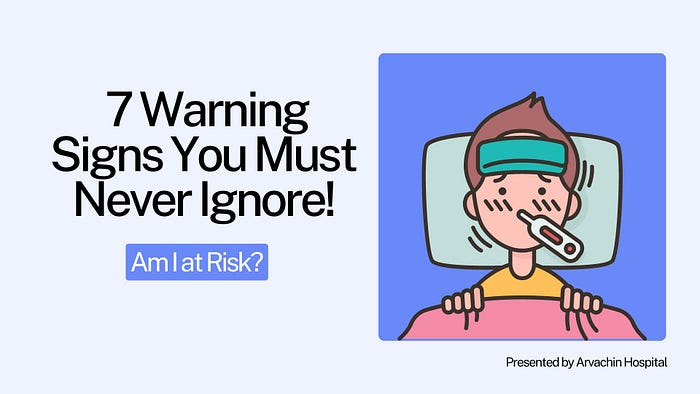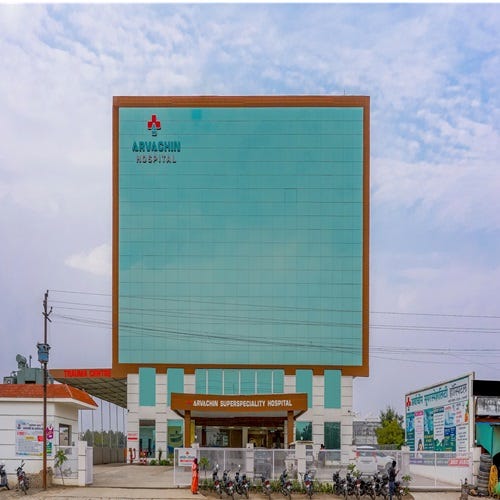 7 Warning Signs You Must Never Ignore!
7 Warning Signs You Must Never Ignore!
Health takes a backseat in our hectic lives, but vigilance in the bodies that they carry makes the difference. Noticing warning signs of something that’s amiss makes up for early intervention and better health outcomes. Here are seven warning signs you must never understand. They can help you act quickly when it matters most.
1. Severe Chest Pain or Uncomfortable feeling
Chest pain can be sharp, pressure-like, or just uncomfortable; it shoots down into the shoulders, neck, or arms. It may just be heartburn or more: angina or a heart attack. For chest pain, especially if you’re also feeling shortness of breath, sweating, or nausea, call emergency services immediately.
Bottom Line:
*Do not wait for the pain to subside. Your survival may depend on rapid evaluation*.
2. Accidental Weight Loss
Weight loss is more than 5% of body weight over a period of six months without any identified cause. It can be attributed to metabolic causes such as hyperthyroidism, disorders of the gastrointestinal system, or even malignancies. So dieting or on an exercise routine and consulting a doctor for better assessment.
Take Away
Weight Loss. Serious health problems are lurking in the future; stress or aging is not the only culprit.
3. Severe Headaches
Headaches are widespread, but a sudden, severe headache is not an ordinary headache; it can signal such things as migraine, stroke, or an aneurysm. A “worst headache in your life” should bring you to the doctor right away since this might imply that you’re bleeding in your brain.
Always be on the lookout for a change in your headache pattern.
4. Vision Changes
Headache sometimes causes disturbances of vision, blurring, double vision, or loss of vision due to many conditions such as migraine, retinal detachment, or increased intracranial pressure. The presence of these symptoms, along with headache or other neurological disturbances, will necessitate seeing an eye specialist or your primary physician.
Key Takeaway:
Vision is an important symptom—don't dismiss changes or loss of vision.
5. Numbness or Weakness
Numbness or weakness of one side of the face, arm, or leg are common symptoms experienced with a stroke. These two-word components within the acronym named FAST-Face drooping, arm weakness, speech difficulty, and time to call emergency services are helpful in people’s recognition of possible symptoms that may indicate a stroke. The delay between receiving urgent attention or death may depend on it.
* Don’t wait! Seek medical care right away if you have a sudden inability to speak or understand speech, weakness or numbness in the face, arm, or leg, sudden numbness or weakness of the face, arm, or leg, trouble speaking or understanding speech, or trouble seeing in one or both eyes.
6. Intractable Fever
Most of the time, a fever lasting more than three days or recurring frequently is indicative of an infection or an inflammatory process occurring in your body. Examples include pneumonia, urinary tract infections, or specific cancers and conditions that last much longer. See your doctor immediately if your fever is accompanied by any of the following severe symptoms: you have difficulty breathing, the pain is extremely severe, you have a stiff neck, or you have a headache or rash.
Key Takeaway:
Fever can be your body's signaling infection; listen to it!
One bad change in bowel or bladder habits, like frequent diarrhea or blood in the urine or stools, should never be ignored. Such changes could be connected to gastrointestinal disorders or infections and even some cancers that must be identified and treated promptly.
Key Takeaway:
Report new changes in your bowel or bladder habits to your doctor.
— — — — — — — — — — — — — — — — — — — — — — — — — — — — — — —
Know When to Seek Help
The closer you are to understanding these warning signs, the better your chances will be of getting help before it is too late. If you, or a friend or family member, ever have any of these symptoms, seek help immediately.
Best Hospital In Varanasi Arvachin Hospital is your pathway to healthy living. Our experienced network of healthcare professionals and state-of-the-art facilities are designed to provide high-quality care catering to all your needs. From routine check-ups to advanced diagnostics and treatments, you can start receiving total care in a compassionate setting.
Why Arvachin Hospital?

Experienced Doctors: Our doctors are experienced with all types of medical treatments. We promise you the best and finest quality care.
State-of-the-art technology: All new diagnostics and treatment techniques are in use here to ensure proper health management.
Patient-centered approach: All of your healthiness and comfort will be the core, and we shall do our best to establish that kind of setting for you.
All Services: From emergency care to specialty treatments, we provide an array of services to ensure your health needs are met.
Conclusion
Having information regarding the latest health concerns and knowing the dangerous symptoms would save lives. At Best Hospital In Varanasi Arvachin Hospital, we pursue our goal of ensuring a healthy lifestyle with the recommendation to keep good health without any health complications. Feel free to call us today regarding inquiries or setting an appointment. Your health is always on top, and we are always here for you every step of the way.
Comments
Post a Comment